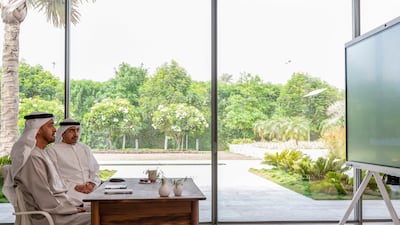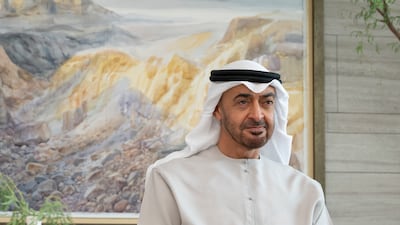Latest on President Joe Biden's visit to the Middle East here
The UAE is to invest $2 billion in "agricultural food parks" across India in an effort to boost food security across South-East Asia and the Middle East.
The project was the first announcement made by the leaders of the UAE, the US, Israel and India after an online summit on Thursday of the newly formed I2U2 bloc.
This meeting took place on the first full day of US President Joe Biden's visit to Israel. He was joined remotely by President Sheikh Mohamed, Israeli Prime Minister Yair Lapid and India's Prime Minister Narendra Modi.
The food parks are part of a push to build "innovative, inclusive and science-based solutions to enhance food security and sustainable food systems," the leaders said in a joint statement.
Israel and the US will bring state-of-the-art technologies as well as expertise to the integrated food parks across India, which will provide the land and help farmers integrate into the project.
The aim of these parks is to "reduce food waste and spoilage, conserve fresh water, and employ renewable energy sources" to maximise crop yields and help tackle food insecurity in South Asia and the Middle East.
“This unique grouping of countries aims to harness the vibrancy of our societies and entrepreneurial spirit to tackle some of the greatest challenges confronting our world, with a particular focus on joint investments and new initiatives in water, energy, transportation, space, health and food security,” the leaders said.
They said the projects were just "the first steps in a long-term strategic partnership to promote initiatives and investments that improve the movement of people and goods across hemispheres, and increase sustainability and resilience through collaborative science and technology partnerships".
Sheikh Mohamed said the summit was clear evidence of the great opportunities for co-operation between countries and economies with shared values and goals centred around peace, tolerance and prosperity.
"We, in the UAE, believe that the economy offers the best way to achieve peace, security and progress. Especially when governments and people have the will and courage to build partnerships and face challenges," the President said.
"We also believe that only partnerships can overcome today's complex and overlapping challenges, the most important of which are food and energy security, climate change and health care," he said.
The idea of the I2U2 group was born several months ago during a dinner at the home of Minister of State and UAE ambassador to the US Yousef Al Otaiba, said Israeli Prime Minister Yair Lapid.
The leaders were "discussing how after we get control over the pandemic, anyone trying to get back at how things used to be would fail," he said.
"Our starting point was that in the new world we live today what we need to improve is our ability to co-operate quickly to make the most of our advantages."
Mr Biden said that states must always think about "what can we achieve together" to tackle global crises.
"The challenge we face in our world demands we find new ways of working together, whether it is dealing with the climate crisis which is felt here in the Middle East every day or the growing food insecurity," he said.
"All these issues require co-operation and co-ordination, the more we work together, the more we will see the benefits multiply and grow to our shared commitment to peace and prosperity."
For Mr Modi, progress has already been made on working to increase investments in the fields of water, energy, environment, health and space.
"I am confident that with I2U2, we will make significant contributions to energy security, food security and economic growth globally," he said.
“Our co-operative framework is also a good model for practical co-operation in the face of increasing global uncertainties."
As well as the $2bn for the food parks, the leaders announced an advanced "hybrid renewable energy project in India’s Gujarat State consisting of 300 megawatts wind and solar capacity complemented by a battery energy storage system".
The US has already funded a $330 million feasibility study for the project and UAE-based companies are exploring opportunities, the leaders said. Indian, Israeli and US-based companies also want to invest and contribute to India's goal of 500 Gigawatts of non-fossil fuel production by 2030.
"Such projects have the potential to make India a global hub for alternate supply chains in the renewable energy sector," the statement read.
Although the first meeting of leaders from the four countries focused on food security and clean energy issues, the nations reaffirmed their commitment to the Abraham Accords, which normalised relations between Israel and several Arab nations, including the UAE.
“We also welcome other new groupings of countries, such as the Negev Forum for regional co-operation, that recognise the unique contributions of each partner country, including Israel’s ability to serve as an innovation hub connecting new partners and hemispheres to strategically address challenges that are too great for any one country to manage alone,” they said.
Mr Biden met Israeli leaders on Wednesday and is reaffirming Washington’s support for the country. He will meet Palestinian Authority President Mahmoud Abbas on Friday in the occupied West Bank.
He will then travel on to Jeddah to meet Saudi officials, including King Salman and Crown Prince Mohamed bin Salman, before attending a GCC meeting that will also include Egypt, Jordan and Iraq.



































































